Ten mistakes Swedes make when speaking English
While Swedes may be some of the world's best non-native English speakers, there are a few common – and often charming – mistakes The Local's team has spotted while chatting to them in their second language.
1. Sheep shoes
We absolutely adore how 'ch' often becomes 'sh' in Swedish, but it sometimes baffles us. When a Swede says they're going to "choose" something, we might be looking around trying to understand what shoes they're talking about. If they have managed to find some bargain footwear, those new shoes usually have nothing to do with fluffy farm animals, although Swedes may be quick to tell us they were "sheep" (instead of "cheap"). "Children" often become "Shildren" in Sweden.
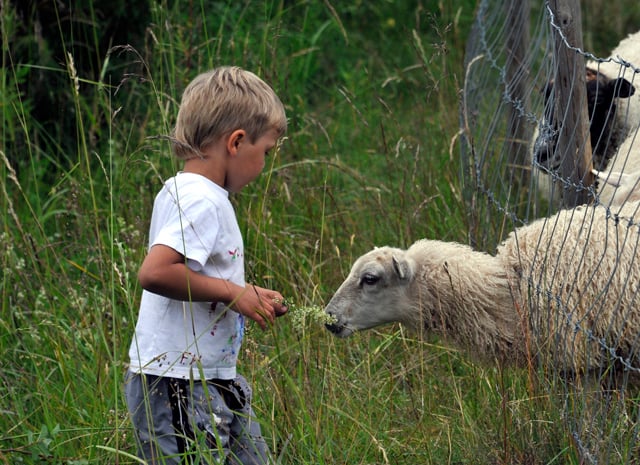
A sheep and a child. Photo: Hasse Holmberg/SCANPIX/TT
2. The Wikings
Those Swedish Vikings may have braved rough waters and conquered distant lands – but one thing their descendants haven't all managed to do is distinguish between the English letters 'v' and 'w'. This one can be especially misleading, with words like "very" confusingly becoming "weary", and leaving us wondering if our Swedish compatriots are feeling a little tired. We have also found the opposite to be true, with the 'w' sometimes becoming 'v' instead – so "shall we go" may sound more like "shall vi go", which incidentally sounds a whole lot like the Swedish equivalent: "ska vi gå".
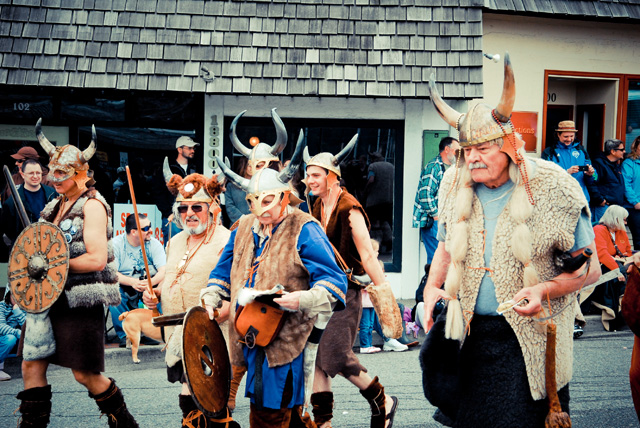
We cannot independently verify the authenticity of the Vikings in this photo. Photo: Andrew Taylor/Flickr
3. Yanitor, Ninya and Yoolery
The difference between letters 'y' and 'j' may not be as apparent to the native Swedish speaker as it is for those of us for whom English is our mother tongue. So you may get confused when a Swede says "yump" (is that some kind of Scandinavian bump?), "yoke" (not the one in the egg), or "yawn" (no one is tired, we're just talking about that guy named John).

Yoolery, also known as jewelery. Photo: Staffan Löwstedt/SvD/TT
4. Restaurang
As opposed to restaurant. It's no wonder Swedes might confuse the two, considering there's only one letter that's different between both languages. To the native English speaker though, that one letter is the difference between the English word and its Swedish equivalent. It bizarrely sounds like Swedes are speaking in an Asian accent when they say "let's go to the restaurang". Try it.

What Swedes might refer to as a 'restaurang'. Photo: Tina Stafrén/imagebank.sweden.se
5. Mars
No, not the planet. They mean the month. But it's a very reasonable guess, considering March is spelled 'Mars' in Swedish. If you're not saying Mars, though you're likely saying "Marsh", the Swedish pronounciation for the month – that 'ch' and 'sh' mix up we mentioned earlier. A special mention also goes to how Swedes also commonly pronounce the letters 'z' as 's'. You may have to ask some Swedes to repeat the word Brazil five times before realizing they're referred to the Amazonian country as "Brasssil".

The planet, not the month. Photo: Kevin Gill/Flickr
6. Feets
We have two feet, not two "feets". Our best explanation for Swedes getting in a muddle here is that the Swedish word for foot is "fot", and plural would be "fötter". Whatever, we reckon it is the cutest and clumsiest way we have ever heard anyone refer to two feet.
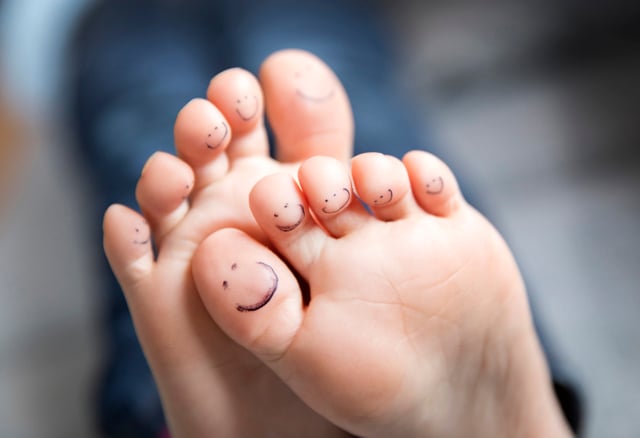 One foot, two feet. Photo: Gorm Kallestad/NTB scanpix/TT
One foot, two feet. Photo: Gorm Kallestad/NTB scanpix/TT
7. House (instead of building)
This could be one of the first puzzling miscommunication moments that emerges when a native English speaker visits Sweden. "They're going to build a lot of new houses here," a Swede once told us when we were smack in the middle of downtown Stockholm, leaving us struggling to comprehend how residential houses would suddenly go up in the middle of a business district. It was because they actually meant "buildings" – not houses. Easy explanation: the word for house and building is covered by the all-encompassing word "hus" in Swedish.
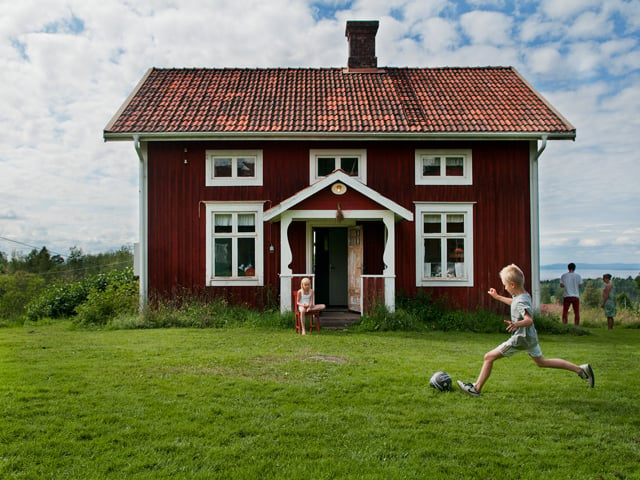
A Swedish house. Or building. It's your pick if you're Swedish. Photo: Johan Willner/imagebank.sweden.se
8. Funny or fun?
We love this one. "It was so funny when I took my kids out to the park," a Swede may say, before telling you more about what they did that day. Maybe they met another family, ate some sandwiches, saw a few birds...Still waiting for the punch line? There isn't one. And this has nothing to do with Swedes having a different sense of humour. It's actually just a confusion between the terms "funny" and "fun", with some Swedes using the jokey term interchangeably with "fun", which doesn't always involve laughter or humour. There's an easy explanation here again: the word "roligt" in Swedish can mean both fun and funny, depending on the context.
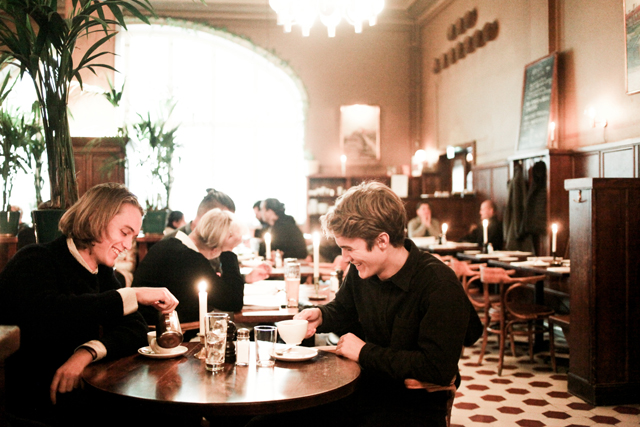
Is something funny, or are they just having fun? Photo: Tove Freiij/imagebank.sweden.se
9. Do you feel that smell?
The problem here is that English speakers don't exactly "feel" smells… we just smell them. It's another case of lost in translation. Swedes say "känner du lukten", which literally translates to "Do you feel the smell?"

Feeling smells can sometimes be a true pleasure. Photo: Thomas Kienzle/AP/TT
10. Afterwork
Not really a misproununciation here, but more of a whole new made up word, "Afterwork" is one of our favourite quirks in the Swedish language. It refers to a gathering of people for drinks at a bar immediately after work (often in time for a discounted "Happy Hour"). But Swedes have somehow coined this expression themselves. We have heard it elsewhere in Scandinavia too…but really, nowhere else. Our equivalent? Well, there really isn't one. "How about some drinks?" you might say to a colleague at 7pm in New York (note the later finishing time), or in London, "pub?" would suffice. Some Swedes now shorten "After Work" to "AW", so if you get a text inviting you to the latter, it has nothing to do with fashion (as in an "Autumn/Winter" show) or "Advanced Warfare" (you'll know where this comes from if you love the computer game Call of Duty). It just means grabbing a drink, which almost always gets our vote.

What a Swedish 'Afterwork' might look like. Photo: Simon Paulin/imagebank.sweden.se
Article first published in 2015 and updated in 2019.
Comments
See Also
1. Sheep shoes
We absolutely adore how 'ch' often becomes 'sh' in Swedish, but it sometimes baffles us. When a Swede says they're going to "choose" something, we might be looking around trying to understand what shoes they're talking about. If they have managed to find some bargain footwear, those new shoes usually have nothing to do with fluffy farm animals, although Swedes may be quick to tell us they were "sheep" (instead of "cheap"). "Children" often become "Shildren" in Sweden.

A sheep and a child. Photo: Hasse Holmberg/SCANPIX/TT
2. The Wikings
Those Swedish Vikings may have braved rough waters and conquered distant lands – but one thing their descendants haven't all managed to do is distinguish between the English letters 'v' and 'w'. This one can be especially misleading, with words like "very" confusingly becoming "weary", and leaving us wondering if our Swedish compatriots are feeling a little tired. We have also found the opposite to be true, with the 'w' sometimes becoming 'v' instead – so "shall we go" may sound more like "shall vi go", which incidentally sounds a whole lot like the Swedish equivalent: "ska vi gå".

We cannot independently verify the authenticity of the Vikings in this photo. Photo: Andrew Taylor/Flickr
3. Yanitor, Ninya and Yoolery
The difference between letters 'y' and 'j' may not be as apparent to the native Swedish speaker as it is for those of us for whom English is our mother tongue. So you may get confused when a Swede says "yump" (is that some kind of Scandinavian bump?), "yoke" (not the one in the egg), or "yawn" (no one is tired, we're just talking about that guy named John).

Yoolery, also known as jewelery. Photo: Staffan Löwstedt/SvD/TT
4. Restaurang
As opposed to restaurant. It's no wonder Swedes might confuse the two, considering there's only one letter that's different between both languages. To the native English speaker though, that one letter is the difference between the English word and its Swedish equivalent. It bizarrely sounds like Swedes are speaking in an Asian accent when they say "let's go to the restaurang". Try it.

What Swedes might refer to as a 'restaurang'. Photo: Tina Stafrén/imagebank.sweden.se
5. Mars
No, not the planet. They mean the month. But it's a very reasonable guess, considering March is spelled 'Mars' in Swedish. If you're not saying Mars, though you're likely saying "Marsh", the Swedish pronounciation for the month – that 'ch' and 'sh' mix up we mentioned earlier. A special mention also goes to how Swedes also commonly pronounce the letters 'z' as 's'. You may have to ask some Swedes to repeat the word Brazil five times before realizing they're referred to the Amazonian country as "Brasssil".

The planet, not the month. Photo: Kevin Gill/Flickr
6. Feets
We have two feet, not two "feets". Our best explanation for Swedes getting in a muddle here is that the Swedish word for foot is "fot", and plural would be "fötter". Whatever, we reckon it is the cutest and clumsiest way we have ever heard anyone refer to two feet.
 One foot, two feet. Photo: Gorm Kallestad/NTB scanpix/TT
One foot, two feet. Photo: Gorm Kallestad/NTB scanpix/TT
7. House (instead of building)
This could be one of the first puzzling miscommunication moments that emerges when a native English speaker visits Sweden. "They're going to build a lot of new houses here," a Swede once told us when we were smack in the middle of downtown Stockholm, leaving us struggling to comprehend how residential houses would suddenly go up in the middle of a business district. It was because they actually meant "buildings" – not houses. Easy explanation: the word for house and building is covered by the all-encompassing word "hus" in Swedish.

A Swedish house. Or building. It's your pick if you're Swedish. Photo: Johan Willner/imagebank.sweden.se
8. Funny or fun?
We love this one. "It was so funny when I took my kids out to the park," a Swede may say, before telling you more about what they did that day. Maybe they met another family, ate some sandwiches, saw a few birds...Still waiting for the punch line? There isn't one. And this has nothing to do with Swedes having a different sense of humour. It's actually just a confusion between the terms "funny" and "fun", with some Swedes using the jokey term interchangeably with "fun", which doesn't always involve laughter or humour. There's an easy explanation here again: the word "roligt" in Swedish can mean both fun and funny, depending on the context.

Is something funny, or are they just having fun? Photo: Tove Freiij/imagebank.sweden.se
9. Do you feel that smell?
The problem here is that English speakers don't exactly "feel" smells… we just smell them. It's another case of lost in translation. Swedes say "känner du lukten", which literally translates to "Do you feel the smell?"

Feeling smells can sometimes be a true pleasure. Photo: Thomas Kienzle/AP/TT
10. Afterwork
Not really a misproununciation here, but more of a whole new made up word, "Afterwork" is one of our favourite quirks in the Swedish language. It refers to a gathering of people for drinks at a bar immediately after work (often in time for a discounted "Happy Hour"). But Swedes have somehow coined this expression themselves. We have heard it elsewhere in Scandinavia too…but really, nowhere else. Our equivalent? Well, there really isn't one. "How about some drinks?" you might say to a colleague at 7pm in New York (note the later finishing time), or in London, "pub?" would suffice. Some Swedes now shorten "After Work" to "AW", so if you get a text inviting you to the latter, it has nothing to do with fashion (as in an "Autumn/Winter" show) or "Advanced Warfare" (you'll know where this comes from if you love the computer game Call of Duty). It just means grabbing a drink, which almost always gets our vote.

What a Swedish 'Afterwork' might look like. Photo: Simon Paulin/imagebank.sweden.se
Article first published in 2015 and updated in 2019.
Join the conversation in our comments section below. Share your own views and experience and if you have a question or suggestion for our journalists then email us at [email protected].
Please keep comments civil, constructive and on topic – and make sure to read our terms of use before getting involved.
Please log in here to leave a comment.